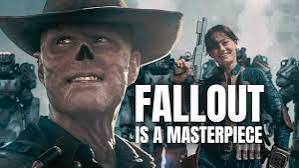Why *Fallout* Is the Best Video Game Adaptation Ever Made
A couple of years back, I was sprawled on my couch, scrolling through streaming options, half-asleep and nursing a lukewarm coffee. I’d just finished a brutal workweek and needed something to shut my brain off. That’s when I stumbled across *Fallout* on Amazon Prime. I’m a sucker for post-apocalyptic stuff—always have been—but video game adaptations? They’re usually a mixed bag. (Okay, more like a bag of irradiated mutfruit.) I hit play, not expecting much. Boy, was I wrong.
Let’s get one thing straight: adapting a video game into a show or movie is like trying to bottle a thunderstorm. Games like *Fallout*—the Bethesda RPG series that’s been around since the ‘90s—are massive, sprawling worlds where players make their own choices. You’re a vault dweller one minute, a wasteland wanderer the next, deciding whether to save a settlement or nuke it for kicks. How do you cram that into a linear story without it feeling like a cheap knockoff? Most adaptations don’t even try. They slap on some familiar visuals, toss in a few easter eggs, and call it a day. But *Fallout*? It’s different. It’s *special*.
First off, the show nails the vibe. If you’ve ever played *Fallout 3* or *New Vegas*, you know the feeling: that mix of retro-futuristic charm, dark humor, and straight-up weirdness. The show captures it perfectly. From the moment Lucy, our wide-eyed vault dweller, steps into the wasteland, you’re hit with that 1950s atomic optimism gone horribly wrong. Jukebox tunes play while mutants lurk in the shadows. Pip-Boys beep. Nuka-Cola bottles litter the ground. It’s like stepping into the game, but you don’t need a controller. I kept waiting for the moment it would feel “off,†but it never did. (Well, maybe that one scene with the Yao Guai felt a bit rushed, but I’m nitpicking.)
What really sets *Fallout* apart, though, is how it respects the source material without pandering. A lot of adaptations—looking at you, *Halo*—seem embarrassed by their roots. They strip away the quirky stuff to appeal to a broader crowd and end up alienating everyone. *Fallout* leans into the weird. The showrunners, Jonathan Nolan and Lisa Joy, clearly played the games. They get that *Fallout* isn’t just about shooting super mutants or scavenging bottlecaps. It’s about the world—its factions, its moral grayness, its absurd humor. The Brotherhood of Steel feels like the dogmatic tech-cult they are. The Enclave’s creepy authoritarianism is spot-on. Even the random side characters, like that ghoul bartender I swear I met in *Fallout 4*, feel like they belong.
And can we talk about the characters? Lucy, played by Ella Purnell, is the heart of the show. She’s not just a naive vault girl; she’s got this stubborn optimism that makes you root for her, even when she’s making terrible decisions. (Haven’t we all been there, thinking we can charm our way out of a bad situation?) Then there’s Maximus, the Brotherhood squire who’s equal parts badass and insecure. And don’t get me started on Walton Goggins’ Ghoul. The guy’s a walking masterclass in charisma—part cowboy, part zombie, all attitude. Their stories weave together in a way that feels organic, not like some forced Hollywood plot. It’s the kind of storytelling that makes you forget you’re watching a show based on a game.
Here’s where I might sound like a fanboy, but hear me out: *Fallout* doesn’t just adapt the game; it adds to it. The show dives into the lore—Vault-Tec’s shady experiments, the pre-war world’s collapse—without feeling like a Wikipedia dump. It’s not afraid to tell a new story, either. Unlike *The Last of Us* (which, don’t get me wrong, is fantastic), *Fallout* doesn’t retread the game’s plot. It builds a fresh narrative that fits the universe like a well-worn vault suit. That’s a bold move. Most adaptations play it safe, sticking to the “greatest hits†of the source material. *Fallout* takes risks, and they pay off.
I’ve noticed something else, too. The show doesn’t talk down to you. It assumes you’re smart enough to piece things together, whether you’ve played the games or not. My buddy, who’s never touched a *Fallout* game, binged the whole season in a weekend and loved it. Meanwhile, I was geeking out over references to the New California Republic and shouting “I KNEW IT!†at my TV when a certain vault reveal happened. (No spoilers, but if you know, you know.) That’s the magic of it—it’s accessible but rewarding for diehards.
If I had to pick one reason *Fallout* stands above the rest, it’s this: it feels like it was made by people who love the source material as much as I do. Compare that to, say, the *Resident Evil* movies, which felt like someone skimmed a game manual and said, “Zombies, right? Good enough.†*Fallout* respects the fans while inviting newbies to the party. It’s the kind of show you watch late at night, maybe with a beer or some takeout, and suddenly it’s 3 a.m. and you’re texting your friends about how you need to replay *New Vegas*.
Is it perfect? Nah, nothing is. Some of the pacing in the middle episodes drags a bit, and I’m still not sure how I feel about that one plot twist with the Enclave. But those are small gripes in a show that gets so much right. In my experience, no other video game adaptation has come close to this level of care, craft, and downright fun.
So, here’s the big question: has *Fallout* cracked the code for video game adaptations, or is it just a one-in-a-million fluke? I’m leaning toward the former, but I’d love to hear what you think. Either way, I’m already counting down to season two. Now, if you’ll excuse me, I’ve got a wasteland to wander—on my TV screen, at least. 😃




No comments yet
Be the first to share your thoughts!